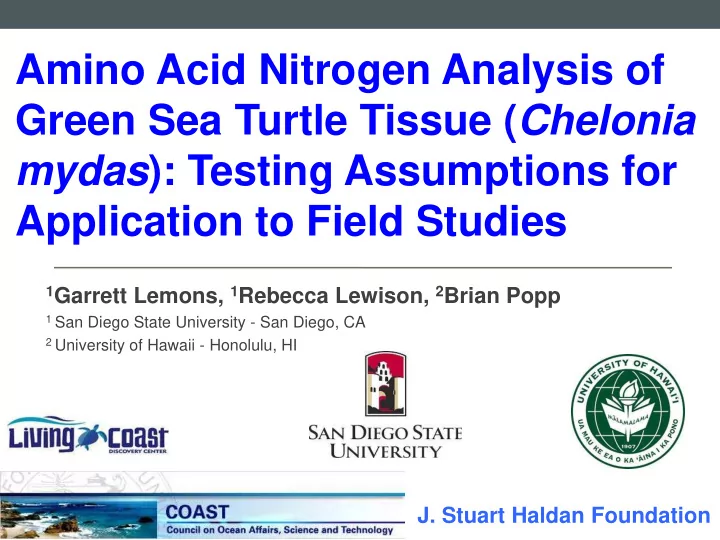

Amino Acid Nitrogen Analysis of Green Sea Turtle Tissue ( Chelonia mydas ): Testing Assumptions for Application to Field Studies 1 Garrett Lemons, 1 Rebecca Lewison, 2 Brian Popp 1 San Diego State University - San Diego, CA 2 University of Hawaii - Honolulu, HI J. Stuart Haldan Foundation
Green turtles: challenging to study • Complex life histories • Difficult to access habitats • Highly migratory • Cryptic in nature Methods of study? • Telemetry • Surveys • Stable Isotopes
Diet? Duration? ? Habitat use?
Δ Trophic interactions Δ Nutrient composition Arthur et al. (2008)
Analysis of δ 15 N ENRICHMENT
Global patterns of N 2 fixation & denitrification N 2 Fixation = ↓ δ 15 N Denitrification = ↑ δ 15 N N* map courtesy of Francisco Chavez
Analysis of stable δ 15 N Δ δ 15 N
Bulk vs. amino acid SIA LYS PRO THR VAL GLU PHE ISO ALA BULK δ 15 N CSIA δ 15 N
δ 15 N analysis of amino acids Source Trophic McClelland and Montoya (2002)
Using AA-CSIA we assume… • Trophic and source amino acids are the same across taxa and tissue types. • Constants for equations, such as trophic discrimination factors, are the same across taxa and tissues. • Turnover rates are based on previously published bulk studie.
Research questions 1. What are green turtle and tissue-specific amino acids? 2. What are green turtle tissue specific Trophic discrimination factors (TDFs)? TL x/y = (δ 15 N Glu – δ 15 N Phe – 3.4 x/y )/(Δ x – Δ y ) + 1 1. If above questions are validated, then we need to understand what is the temporal framework or turnover rates for tissue?
Experiment • 4 captive East Pacific green turtles • Steady state determination Diet switch to 15 N depleted diet • Interval sampling of skin and • blood
1. Green turtle-specific amino acids? Δ 15N ( 15 N consumer – 15 N diet ‰) plasma Trophic Source
2.Trophic discrimination factors for plasma? Trophic AA δ 15 N – Source AA δ 15 N = TDF (‰) Chikaraishi et McClelland and al. (2009) C. Mydas Montoya (2002) TrophicAA - SourceAA (‰) (‰) (‰) 6.59 Glu - Phe 6.4 7.6 5.92 Glu - Lys 5.1 - 5.42 Val - Phe - 4.6 4.66 Val - Lys 2.6 -
3.Turnover rates for plasma? SOURCE AAs T2 T3 T4 Days
Glutamic acid N turnover T4 TROPHIC AAs Valine N turnover T3
Summary • Successfully identified source and trophic AAs for green turtle • Difference among taxa • Appropriate AA selection • Successfully determining TDFs for plasma and skin • Difference between tissue and animal • Preliminary N turnover in plasma • Temporal framework for tissues
Significance • First validation for a marine megafauna • One isotope, more insight • Nutrient dynamics over large spatial scales • Advancing field application by testing assumptions
Acknowledgments • Stuart Haldan, and the J. Stuart Haldan charitable foundation • COAST Graduate research award • Ferris Travel student travel award • Research Assistants – Christina Coppenrath, Linda Duling • NOAA/SWFSC – J. Seminoff, Robin, Camryn, Joel, Erin • SDSU – Entire Lewison lab and committee members, Dr. Lai, Dr. Schellenberg • University of Hawaii –Natalie Walsgrove, Cassie • Living Coast Discovery Center – Beth Sabiston , Ben Vallejos, Lindsay Bradshaw, Gilberto
Questions?
Recommend
More recommend